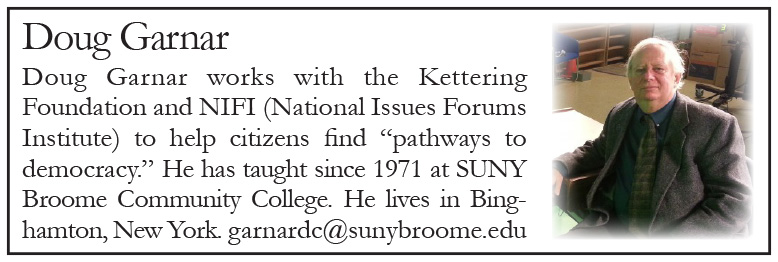Pathways to Democracy-A House Divided: Deliberation and action
by Doug Garnar –
Among other things, the Founding Fathers in the Preamble to the Constitution called for “a more perfect union…”, and a government that would “promote the general welfare…”. In 1858 Lincoln argued that, “A house divided against itself can not stand…I do not expect the Union to be dissolved…but I do also expect it will cease to be divided…. A civil war three years later, the bloodiest in American history, finally resolved the issue of slavery.
Today, we are faced with a growing list of serious, complex problems ranging from a 22 trillion dollar debt, immigration, climate change, disruptive technology – which both creates/destroys work/impacts our values, health care and the sustainability of safety net programs (Social Security,Medicare/Medicaid). Both parties either deny the problems or kick the can down the road. Steve Chapman of the CHICAGO TRIBUNE puts it this way, “American politics is a bicycle with a rusty chain, flat tires, and no brakes. It’s broken, and it’s not taking any of us where we want to go.”
To buttress this diagnosis, consider the following:
• A recent Pew poll indicated that 70% of Americans think the country is on the wrong track.
• Americans vote in national level elections at a much lower rate (barely 50%) than many other democracies.
• Volunteering and contributions to not for profits are now declining.
• Citizen confidence in our basic institutions (Congress, the mainstream media, social media, intelligence agencies and even the Supreme Court) ranges between the low teens to low forty percentiles.
Some key questions to consider:
• What would we need to do to get the political system we want?
• What should we do to revive our ability to work together on our most urgent problems?
• What are we willing to give up to do so?
The National Issues Forum has created a new issues guide to promote citizen deliberation about the aforementioned questions. Working in groups of 15-20, a moderator takes citizens through a 90-120 minute deliberation looking at three different approaches to work toward aligning our democracy with the Founding Fathers’ Preamble goals. Such forums can be run in schools, public libraries, senior citizen centers, veterans’ halls, volunteer fire stations, churches/synagogues/mosques, chambers of commerce and service organization such as Rotaries, Lions, and Sertoma organizations. An online version of deliberation will be available soon.
The new forum is divided into three actions:
Option 1: Reduce Toxic Talk
Deliberate the following actions (kick abusive people off social media; require opposing views on television; take step against false advertising). The guide also provides counter points for each of the aforementioned actions.
Option 2: .Make fairer rules for politics and follow them
Deliberate the following actions (remove blocks to voting; strengthen voting rights for minorities; draw fairer and more competitive election districts; limit campaign spending). Again as in Option 1 counter points for each action are provided.
Option 3: Take control and make decisions closer to home.
Deliberate the following actions (let local communities set their own rules; give funds to states without restrictions; rely more on community groups; give back control of schools to local school boards). Again as in the first two options counter points for each action are provided.
The National Issues Forums Institute (nifi.org) and the Kettering Foundation (Kettering.org) expect to run hundred of forums, using a “A House Divided” over the next 9 months to promote a deliberative dialog, which they hope will kindle a new civic spirit.
The goals of using a deliberative process include:
• Bringing groups of citizens together to “deliberate,” which means to weigh the merits of a proposed action in a civil fashion, identifying strengths/weaknesses.
• Understand why citizens have different points of view without the resulting demonization of people so evident in our civic culture these days.
• Through deliberation find where there is possible “common ground” and follow up a deliberation to see what actions can be undertaken.
Democracy is never a finished process. It is always a work in progress. While these are difficult times, deliberative democratic practices offer new ways of creating a more engaged citizenry, perhaps the most essential part of democracy. Martin Luther King Jr. once said that only when the sky is most dark do we see the stars. Consider contacting Doug Garnar (garnardc.@sunybroome.edu) or nifi.org/kettering org for information about using “A House Divided” in your community. Become part of a national conversation to improve our democracy and ensure that every voice is heard.
